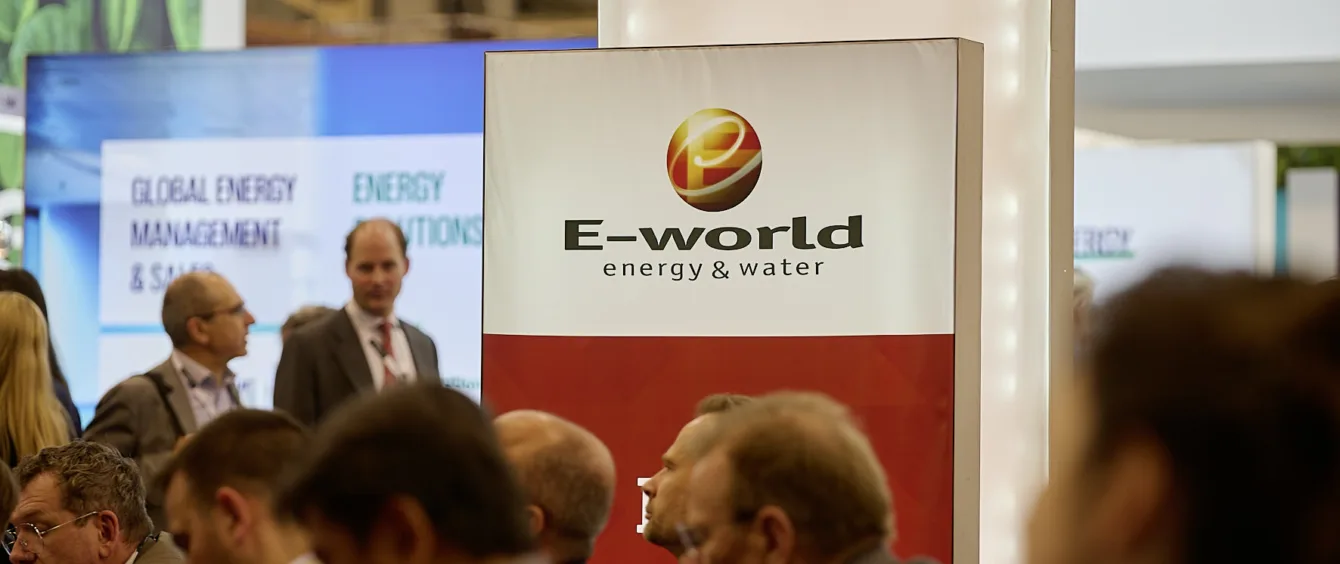Challenging times often prove to be veritable innovation drivers. And this holds true in particular for the energy sector, as demonstrated at E-World. Digitisation, hydrogen and grid infrastructure were the main topics at the energy and hydrogen business trade show. The event held at the Essen fairgrounds ended on 25 May 2023, until which it served as a showcase for promising technologies and a meeting point for sector representatives.
More than 700 companies, institutions and startups from over 25 nations showed up, including such multinational heavyweights as BP, Equinor, OGE, Orsted, RWE and Uniper. Exhibitors along the entire value chain from generation and transmission to storage, trading and sales presented their solutions for the energy transition. The supporting programme had numerous presentations and panel discussions on offer. Topics addressed included global challenges such as security of supply and carbon neutrality as well as trailblazing trends such as artificial intelligence.
Focus on the hydrogen value chain
This time at E-World, there was no way around hydrogen. Players from the research community, business and associations convened to form an illustrious circle at the Hydrogen Solutions Forum, covering everything from fundamental material research at the Rhineland Technical Inspection Authority to regional infrastructure projects the likes of the Ruhr Hydrogen Metropolis (Link in German). From Hyundai’s newest hydrogen car to Fraunhofer research projects relating to the circular economy. Exhibitors mirrored the entire landscape of this fast-growing branch of industry.
Focus on automation and optimisation
Visitors had encounters with digital applications in all five exhibition halls. The spectrum ran the gamut from plant and risk management software to predictive maintenance solutions using databases and algorithm-based trading tools. Across the board, the objective is to optimise increasingly complex energy systems and enable a reliable supply of electricity from renewables.
Focus on infrastructure expansion
However, the transition to sustainable energy sources will only succeed if the requisite infrastructure is in place a topic that was discussed extensively in the supporting programme. This is where officers from the German Grid Agency entered into dialogue with the German Association of Energy and Water Businesses and industry. The matter was also a point of focus off stage as well: For example, RWE and OGE introduced the H2ercules initiative, which is intended to be the centrepiece of Germany’s hydrogen infrastructure. Moreover, among the items showcased by Shell Energie were charging infrastructure solutions.
Platform for startups and innovators
In addition to market leaders, it is customary for many startups to seize this opportunity to show themselves. A total of 90 budding companies were among the exhibitors in 2023. The innovation space in Hall 5 was the upstart hotspot. Here again, centre stage was clearly taken by digital applications: For instance, the PEAK project consortium (Link in German), a Duisburg-Essen University spin-off, showcased a prototype trading platform designed for distributed networks. Munich startup Schwarm Technologies banks on artificial intelligence to process big data for intelligent grid control systems.
In sum, the trade show painted a clear vision: Energy systems will be distributed, digital and decarbonised. State-of-the-art technology already makes this possible. The task at hand now is to turn the numerous innovations from the trade show halls into reality and leverage them to spur the energy transition.
Photo credit: © André Kraß / E-World
